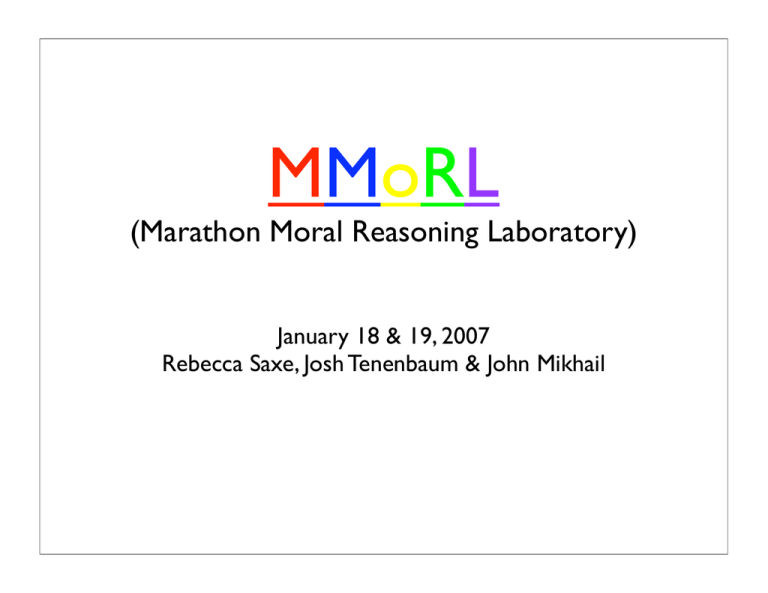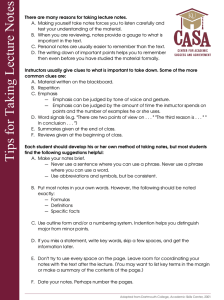M o R L
advertisement

MMoRL (Marathon Moral Reasoning Laboratory) January 18 & 19, 2007 Rebecca Saxe, Josh Tenenbaum & John Mikhail MMoRL The Goal: Conduct a novel, interesting, and valuable experiment about Moral Reasoning in under 24 hours Plan for the Class • THURSDAY 7 - 10 PM • Intro; problem set; & reading • Lecture by Prof Mikhail • Description of homework assignment • FRIDAY 10 AM - 7 PM • Student presentations & discussion (10 - 12) • Conducting experiment (12 - 4:30) • Presentation of Results & Pizza (4:30 - 7) Plan for the Class • THURSDAY 7 - 10 PM • Intro; problem set; & reading Come pick up a problem set; When finished, hand in answers & pick up reading. • Andrew (train driver) 5.45 • Barbara (surgeon) 1.8 • Carl (bystander) 4.3 • Daniel (backpack) 2.1 • Ernie (spinach ill) 5.4 • Frank (spinach safe) 4.1 • Gerry (belch) 5.4 • Ian (plates) 1.4 • Heinz (cancer) 5.2 • John (ticket) 3.2 • Karl (equipment) 1.6 • Luke (injury) 6.5 • Mark (don’t care) 2.4 Homework Assignment The Goal: Conduct a novel, interesting, and valuable experiment about Moral Reasoning in under 24 hours Your Homework: Write the Stimuli Homework Assignment Basic Method: - Paper & Pencil Questionnaire - Participants: your friends, acquaintances, & strangers (mall, subway platform...) - Dress respectably - Reimbursement: small candy/chocolate Homework Assignment Notes on Experimental Design: - Minimal pairs - Between versus Within Subjects Design - Experiment has to be very short! - Hysteresis? - Statistical power: quota of responses per student? Homework Assignment Your Homework: Write the Stimuli • A set of 2, 3, or 4 scenarios + question • As similar as possible, except: • Differ according to some principle of interest • (If 4 scenarios, could test interaction of 2 principles) PRESENTATION TOMORROW (<7 min): 1. Read your scenarios out loud 2. Explain the principle you are trying to test 3. (Starting with students taking the class for credit) 4. We will pick 3 or 4 pairs for the experiment Some Ideas (1) Exploring the Trolley Problem: Why is it OK to push the switch to move the train (killing 1 to save 5), but not OK to kill a patient to distribute organs to 5 dying people? - Intentions vs side-effects - Hands-on causality - “Choosing” the victim (NB: well-covered territory!) Some Ideas (1) Exploring the Trolley Problem: Why is it OK to push the switch to move the train (killing 1 to save 5), but not OK to kill a patient to distribute organs to 5 dying people? - Train Equipment versus Medical Equipment? - Vaccines that save thousands of lives? - A surgeon who saves thousands of lives? Some Ideas (2) Exploring the Side-Effect Effect: Foresees side-effect Says “doesn’t care” Judged more “intentional” for bad than good effects - “Produced effect intentionally” versus “intended to produce effect” - What if effect fails to occur (by luck)? Some Ideas (3) Linking the Trolley Problem and the Side-Effect Effect: Trolley Problem Goal: save 5 Foresees bad effect Judged not “wrong” Side-effect effect Goal: economic Foresees bad effect Says “doesn’t care” Judged more “intentional” - Goal has obvious versus dubious value - Doesn’t care, versus (assume) does care - Judgement: wrongness, versus intentionality Some Ideas (4) The role of belief: Impossible attempts Thinks substance is poison Really just sugar Still judged “forbidden” - Justification of the false belief - “Unreasonable” beliefs like voodoo? - Crimes that occur mainly in the mind e.g.“Impossible” treason? - Causal analysis: unforeseen prevention, versus missing enabler Some Ideas (5) The role of belief: Accidents Thinks substance is sugar Really poison Judged not totally permissible - Why asymmetry versus attempts - Justification of the false belief (vs negligence) - Certainty of the believer - Interaction with desire? Some Ideas (5) Unintended harms: Different kinds of defenses Mistake of Fact Self-Defense Defense of Others Provocation Insanity - Are all defenses equally good? - Does it depend on judgement? e.g.“wrong”,“blameworthy”,“punishable” Some Ideas (7) The “Only One Bad-guy” Theory Do moral judgements of very same action change based on: - (irrelevant) emotions about victim? - victim perceived as active versus passive? Are people who cause accidents viewed as bad-guys? e.g. more likely to deliberately harm in future? Or a principle of your own devising... (but will need to defend it) MMoRL The Goal: Conduct a novel, interesting, and valuable experiment about Moral Reasoning in under 24 hours Your Homework: Write the Stimuli Email them to us ASAP SEE YOU TOMORROW AT 10



